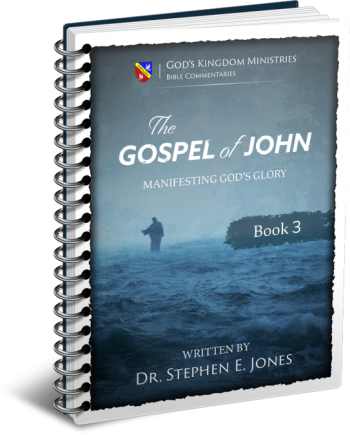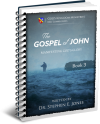Latest Posts
View the latest posts in an easy-to-read list format, with filtering options.

Jesus manifested God's glory through 8 miraculous signs in the gospel of John. These are a revelation of the feast of tabernacles.
Category - Bible Commentaries

John 12:27, 28 says,
27 Now My soul has become troubled; and what shall I say, ‘Father, save Me from this hour?’ But for this purpose I came to this hour. 28 Father, glorify Your name.” Then a voice came out of heaven: “I have both glorified it and will glorify it again.”
After Jesus talked about His impending death, his soul was disturbed, knowing that His time of suffering was drawing near. This was only to increase, culminating in Gethsemane just before His arrest. Perhaps the truth which He had just spoken, “He who loves his life will lose it,” was the cause of this inner conflict, for such is the case with all of us. It is one thing to proclaim a principle while it is untested, but quite another when one is faced with the experience itself.
Jesus was not above such tests. As a man, He was tested in His calling, even as we are in ours. So Heb. 4:15 says,
15 For we do not have a high priest who cannot sympathize with our weaknesses, but One who has been tempted in all things as we are, yet without sin.
Being the Example of serving and honoring the Father (John 12:26), He had to take the lead. His soul recoiled from this, but He knew that He had come to earth for this very purpose. His soul, then, had to submit to the leading of His spirit which knew the Father’s will and plan, for this was the only way to glorify His Father.
John presents this situation within the context of the seventh sign, the resurrection of Lazarus, which had brought Him to the cross. It took a full seven days for Lazarus to be cleansed (Num. 19:14), so he was not fully cleansed until the eighth day.
In similar manner, one who was healed of leprosy (signifying mortality) was unclean for a full seven days and not pronounced fully clean until the 8th day (Lev. 14:8, 10). The 8th day of Tabernacles, too, was a new beginning after completing seven days (Lev. 23:36).
Therefore, the seventh sign in John’s gospel—and specifically, the cross—was a culmination of a process of cleansing us from the uncleanness of mortality and sin. These signs also foreshadowed the days it would take to fulfill the feast of Tabernacles, culminating with the glory of God manifesting in the overcomers and turning the page of world history once again.
John 12:28 gives a significant revelation of the Father Himself, saying, “I have both glorified it [My name] and will glorify it again.” One glorification was past; another lay ahead. Jesus was glorified on Mount Hermon when He was transfigured in front of three disciples. Jesus was about to be glorified “again” at the cross.
In a broader application, Jesus was to be glorified in the two works of Christ. In other words, there were to be two comings of Christ to complete the plan. In the first, He would be glorified as the Lamb of God; in the second, He will be glorified as the Lion King.
Likewise, with those who follow Him and enter into His experience. We too are called to identify with the glory of His death so that we might also identify with the glory of His resurrection. The voice from heaven spoke audibly of these two glories.
John 12:29, 30 says,
29 So the crowd of people who stood by and heard it [the voice from heaven] were saying that it had thundered; others were saying, “An angel has spoken to Him.” 30 Jesus answered and said, “This voice has not come for My sake, but for your sakes.”
At certain times the voice of God was heard without the benefit of understanding. At such times, the people heard a sound that was unintelligible to all but those who had ears to hear. The Israelites heard thunder at Mount Horeb as well, when God descended upon the mount to give the revelation of the law. There we read that “Moses spoke and God answered him with thunder” (Exodus 19:19). Presumably, Moses understood the words of God, while the people did not.
A few days later, the ears of the Israelites were opened partially, and they heard the Ten Commandments. Yet this was too much for them, and they were overcome with fear. Their fear again made God’s words unintelligible, for we read in Exodus 20:18,
18 All the people perceived the thunder and the lightning flashes and the sound of the trumpet and the mountain smoking; and when the people saw it, they trembled and stood at a distance. 19 Then they said to Moses, “Speak to us yourself and we will listen; but let not God speak to us, or we will die.”
Since that time, the ears of the church were closed, and men have feared to hear God’s voice. That day was later celebrated as Pentecost, whose purpose was to speak the words of God in an intelligible manner (as seen in Acts 2:6, 8, 11). But fear, however subtle, took over once again, and so two decades later Paul found it necessary to establish rules and parameters in regard to “the tongues of men and of angels” (1 Cor. 13:1).
No gift of interpretation was needed on the day of Pentecost, but when tongues became unintelligible, interpretation was given in order to give the people understanding. Otherwise, the word of God would remain as thunder, or a trumpet or “bugle” (1 Cor. 14:8, 9).
So when the Father spoke in John 12:28, Jesus heard the words, while the rest of the people heard only noise that sounded like thunder. It is likely that Jesus later told His disciples the precise words that the Father had spoken, thus foreshadowing the gift of interpretation that would be needed in the church.
One might wonder why God would allow the people to hear thunder, when they were yet incapable of hearing the words of the Father. In John 12:30 Jesus said that it was not for Jesus’ sake but for the sake of the people. In what way?
First, it was to let the people know that God had spoken to Jesus and that the Father was confirming His teaching. But the precise revelation was still unintelligible apart from the gift of interpretation of tongues. We see from this that there are also different levels of hearing which are dependent upon whether fear has closed one’s ears or faith has opened them.
This hearing problem was seen later in the Corinthian church (and presumably in the other churches as well). Hence, it is clear that Pentecost has not resolved the hearing problem for many. The purpose of Pentecost is to cause us to hear the words of God distinctly and clearly, but this is not achieved by more than a few. I believe that the feast of Tabernacles is the greater feast and that the overcomers who fulfill that feast will no longer hear thunder, trumpets, or bugles when God speaks or when they read the Scriptures.
In John 12:32-34 Jesus continues, saying,
32 “And I, if I am lifted up from the earth, will draw all men to Myself.” 33 But He was saying this to indicate the kind of death by which he was to die. 34 The crowd then answered Him, “We have heard out of the Law that Christ is to remain forever; and how can You say, ‘The Son of Man must be lifted up’? Who is this Son of Man?”
Jesus knew by revelation that He was to fulfill the prophecy of the serpent in the wilderness, which was lifted up on a pole (probably a cross) to bring healing to the people. He had often described His death on the cross in such terms (John 3:14, 15; 8:28). He knew that by doing so, He would “draw all men” to Himself.
By referring to the serpent on the pole in the days of Moses, He was explaining the prophetic meaning of that incident. However, the people were unaware that this prophesied of the death of the Messiah. Such a thought was inconceivable to them. They saw only one appearance of the Messiah, wherein He would come and not die “into the Age” (eis ton aiona).
Hence, they had been taught “that Christ is to remain forever” (NASB). The Emphatic Diaglott reads, “We heard out of the Law that the Messiah continues to the Age.” Their hearing was yet impaired, and so the story of the serpent in the wilderness was yet “thunder” to them. They knew that it had occurred, but they did not understand the story itself.
Neither did they understand the law of the sacrifices, which laid down the principle of the “Lamb of God” who was to die for the sins of the people. Further, they did not understand the first bird that had to die to cleanse lepers or the first goat that had to die on the Day of Atonement to cover sin. They did not even understand the prophecy in Isaiah 53, which (to us) speaks clearly of the Messiah’s death as a sacrifice for sin.
So they assumed that the Messiah, or “Son of Man,” must certainly be someone else other than Jesus. Their question, then, was, “Who is this Son of Man?” Jesus’ answer was both obscure and revealing at the same time. John 12:35, 36 says,
35 So Jesus said to them, “For a little while longer the Light is among you. Walk while you have the Light, so that darkness will not overtake you; he who walks in the darkness does not know where he goes. 36 While you have the Light, believe in the Light, so that you may become sons of Light.” These things Jesus spoke, and He went away and hid Himself from them.
It is not likely that the people understood Jesus’ answer. The reader, however, is drawn back to John 1:8, where Jesus is identified as the Light. Jesus was soon to leave this world, but those who believed in the Light would still be able to walk without stumbling, because in them was the Holy Spirit, who was the Agent of that Light.
Recall that the previous sign took place when Jesus healed the man who had been born blind. Light had been given to him, so that he no longer walked in darkness. Even as he became one of many “sons of Light,” so also Jesus required men to believe in Him (the Light). Those who did not believe in the Light were to continue walking in the darkness, not knowing where they were going. In other words, those in darkness would read the word without understanding and hear the word as though it were thunder.
This was then illustrated when Jesus “went away and hid Himself from them.” This prophesied of His ascension, when the Light was to be removed. The Judeans in particular were to be affected by this, for having rejected Him as the Messiah, the nation as a whole could not interpret the Law properly. The laws prophesying His death and resurrection remained to them as thunder.